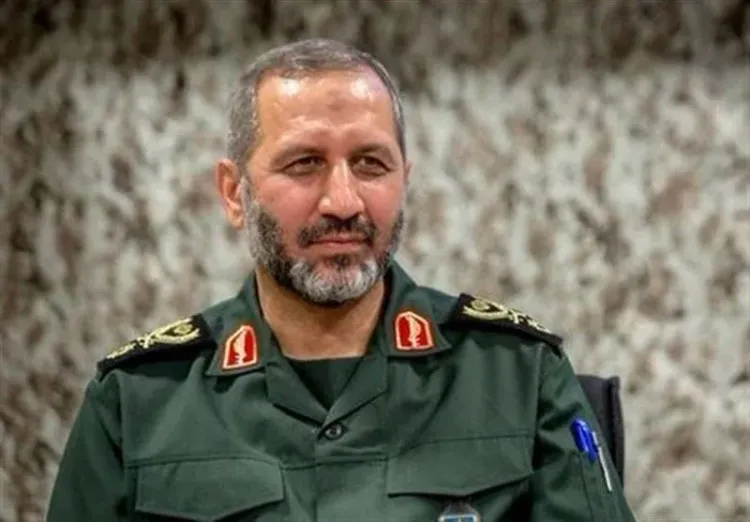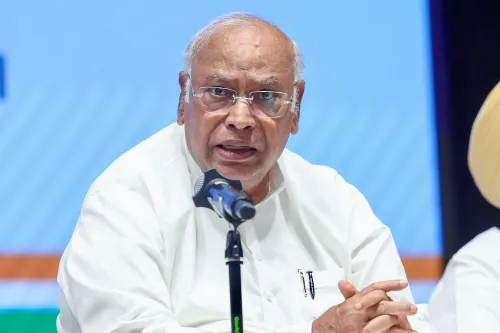Who is the New Chief of IRGC's Aerospace Division?

Synopsis
Key Takeaways
- Ali Khamenei has appointed Seyed Majid Mousavi as the new IRGC Aerospace Division Chief.
- The appointment follows the deaths of key military leaders in Israeli airstrikes.
- The IDF claims significant progress against Iran's nuclear program was made during the operation.
- Many of the eliminated scientists were seen as crucial to Iran's nuclear ambitions.
- The situation highlights ongoing tensions between Iran and Israel.
Tehran, June 14 (NationPress) In a significant move, Iran's Supreme Leader Ali Khamenei has designated new leadership for the army and the Aerospace Division of the Islamic Revolution Guards Corps (IRGC). On Saturday, Seyed Majid Mousavi was appointed as the Chief Commander of the IRGC's Aerospace Division, as reported by the Xinhua news agency citing the semi-official Mehr News Agency.
Mousavi, who previously held the position of deputy commander within the force, ascended to this role following the death of the former chief commander, Amir-Ali Hajizadeh, who tragically lost his life in Israeli airstrikes targeting Tehran on Friday.
In a related appointment, Khamenei selected Amir Hatami, the former Iranian Defence Minister, as the Chief Commander of the army, according to the official news agency IRNA. Hatami fills the role previously held by Abdolrahim Mousavi, who was named Chief of Staff of the Iranian armed forces on the same day after the demise of Mohammad Bagheri due to the earlier Israeli airstrikes.
These airstrikes, which occurred early on Friday, targeted Tehran and several other cities across Iran.
In addition to Bagheri and Hajizadeh, notable figures such as IRGC Chief Commander Hossein Salami and Gholam-Ali Rashid, commander of Iran's Khatam al-Anbiya Central Headquarters, were also killed in the attacks.
The Israeli Defence Forces (IDF) disclosed earlier that nine Iranian nuclear scientists were eliminated during the initial phase of their military operation against Iran’s nuclear program that commenced early on Friday.
According to the IDF, this operation represents a severe setback for Iran’s nuclear aspirations. The nine scientists were pivotal in advancing Iran's pursuit of nuclear weaponry.
The IDF characterized all individuals eliminated as essential contributors to the Iranian nuclear project, each possessing decades of experience in nuclear weapon development.
Those identified among the casualties included Fereydoon Abbasi, a nuclear engineering specialist; Mohammad Mehdi Tehranchi, a physicist; Akbar Motalebi Zadeh, a chemical engineering expert; Saeed Barji, a materials engineering expert; Amir Hassan Fakhahi, a physicist; Abd al-Hamid Minoushehr, a reactor physics expert; Mansour Asgari, a physicist; Ahmad Reza Zolfaghari Daryani, a nuclear engineer; and Ali Bakhouei Katirimi, a mechanical expert.
The IDF noted that many of these individuals were considered potential successors to Mohsen Fakhrizadeh, a prominent nuclear scientist whose assassination in 2020 had significant implications.
The Israeli military stated that these scientists were killed in a coordinated set of airstrikes on Tehran on Friday morning, coinciding with the elimination of numerous senior military personnel, including six high-ranking officials.
The IDF asserted that these strikes were the culmination of extensive covert intelligence operations focused on Iran's leading nuclear experts.
"The success in eliminating these scientists was due to meticulous intelligence efforts that intensified over the previous year as part of a classified IDF strategy," the IDF remarked, highlighting years of work by numerous intelligence officers tracking key figures within Iran's nuclear framework.









